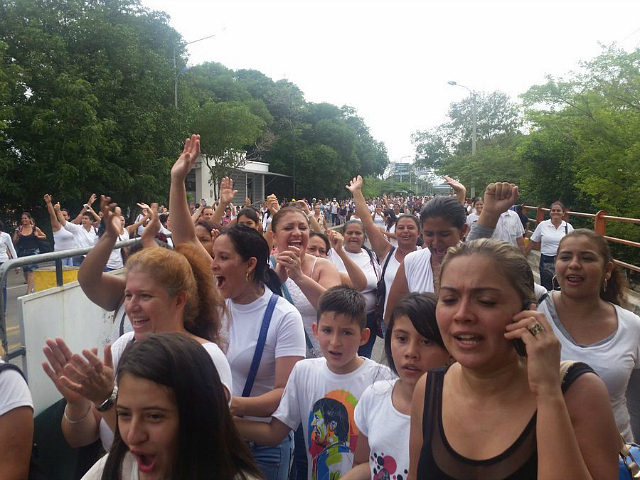Hundreds of Venezuelan women from the western state of Táchira crossed the border into Colombia illegally, demanding the ability to buy food. Once there, the women purchased basic goods like flour and milk and marched home.
Reports suggest that border officials on both sides did little to impede their march, though they were significantly outnumbered. The BBC puts the number of women marching at 500, while local Colombian outlet NTN24 put the number at 700. Most of the women speaking to the media identified as mothers, and many were wearing white, a color associated with anti-communist female protesters in Cuba.
The women chanted, “yes we can,” sang the national anthem, and stopped to pray at the border during their protest, and purchased the goods they needed in an orderly fashion upon arriving in Colombia.
#DDHH Cientos de madres desesperadas llegan a territorio colombianos por alimentos y medicamentos. pic.twitter.com/WMmfq7ODrH
— Diego Villamizar (@VillamizarSal) July 5, 2016
#DDHH La situación de los venezolanos es CRITICA. Madres de Ureña arrodilladas en el puente intnal. suplican.
pic.twitter.com/nT0ccDOyjQ— Noti Cúcuta (@noticucuta) July 5, 2016
Más de 500 mujeres lograron cruzar el puente fronterizo en Ureña pese al cerco de la GNB #protesta #Táchira pic.twitter.com/3MMDTLchIp
— Unidad Venezuela (@unidadvenezuela) July 5, 2016
“We decided to cross the border because there’s no food in our homes and our children are hungry,” one woman told Colombian media, translated by the Miami Herald. Severe shortages have plagued the socialist government of Venezuela for years, forcing families to spend up to eight hours on lines to pay for food at supermarkets. This year, however, shortages have become so pervasive that supermarkets simply have no food to ration out, leaving many families to starve.
The shortages have turned many Chavista supporters against President Nicolás Maduro. Videos began surfacing in April of Chavistas fighting each other over the little food left in the capital — things like onions and flour. In June, a spontaneous protest by people waiting in a supermarket line erupted blocks from the presidential palace, with protesters chanting, “we want food” and marching towards the palace. Police attacked both protesters and journalists covering the event with tear gas and water cannons.
The Colombian government has responded to the border crossing by demanding that Venezuela ease security on the border to allow more people to come through and buy goods. President Juan Manuel Santos announced Wednesday he has assigned Foreign Affairs Minister María Ángela Holguín to coordinate a diplomatic effort to convince Maduro to return the border to a semi-open state, where locals who know each other in small border towns do not need official government permission to cross.
Holguín was clear that her government would strive to aid those suffering under socialist oppression. “We will not let our Venezuelan brothers suffer hunger and the necessities of lacking medicine,” she stated, asserting the need for a “humanitarian corridor” for Venezuelans.
Maduro announced Tuesday, before the march, that he is seeking an expansion of the military, precisely to contain such events. “Our military might must continue to grow,” he asserted, and Venezuela needs to fight “an unconventional war.” He threatened Henry Ramos Allup, the president of the National Assembly and a major opposition leader, with military force. “Don’t mess with the soldiers, don’t mess with sergeants, don’t mess with captains,” he said. “Mess with me, the commander-in-chief of these armed forces, coward!”
At least five opposition activists have been violently arrested for demonstrations against socialism this week.

COMMENTS
Please let us know if you're having issues with commenting.